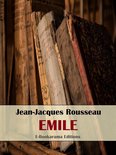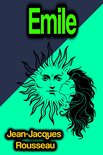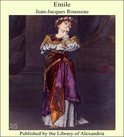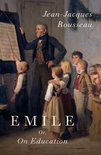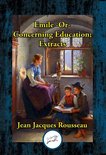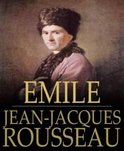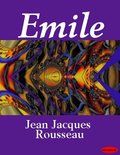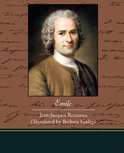Emile Treatise on Education
Afbeeldingen
Sla de afbeeldingen overArtikel vergelijken
Uitgever: Createspace Independent Publishing Platform
- Engels
- Paperback
- 9781523642373
- 23 januari 2016
- 262 pagina's
Jean-Jacques Rousseau
(Bron: Wikipedia. Beschikbaar onder de licentie Creative Commons Naamsvermelding/Gelijk delen.)"
Samenvatting
Treatise on Education
By
Jean-Jacques Rousseau
Translated by Barbara Foxley
Emile, or On Education or Emile, or Treatise on Education is a treatise on the nature of education and on the nature of man written by Jean-Jacques Rousseau, who considered it to be the ''best and most important of all my writings''. Due to a section of the book entitled ''Profession of Faith of the Savoyard Vicar'', Emile was banned in Paris and Geneva and was publicly burned in 1762, the year of its first publication. During the French Revolution, Emile served as the inspiration for what became a new national system of education.
This collection of scattered thoughts and observations has little order or continuity; it was begun to give pleasure to a good mother who thinks for herself. My first idea was to write a tract a few pages long, but I was carried away by my subject, and before I knew what I was doing my tract had become a kind of book, too large indeed for the matter contained in it, but too small for the subject of which it treats. For a long time I hesitated whether to publish it or not, and I have often felt, when at work upon it, that it is one thing to publish a few pamphlets and another to write a book. After vain attempts to improve it, I have decided that it is my duty to publish it as it stands. I consider that public attention requires to be directed to this subject, and even if my own ideas are mistaken, my time will not have been wasted if I stir up others to form right ideas. A solitary who casts his writings before the public without any one to advertise them, without any party ready to defend them, one who does not even know what is thought and said about those writings, is at least free from one anxietyif he is mistaken, no one will take his errors for gospel.
I shall say very little about the value of a good education, nor shall I stop to prove that the customary method of education is bad; this has been done again and again, and I do not wish to fill my book with things which everyone knows. I will merely state that, go as far back as you will, you will find a continual outcry against the established method, but no attempt to suggest a better. The literature and science of our day tend rather to destroy than to build up. We find fault after the manner of a master; to suggest, we must adopt another style, a style less in accordance with the pride of the philosopher. In spite of all those books, whose only aim, so they say, is public utility, the most useful of all arts, the art of training men, is still neglected. Even after Locke's book was written the subject remained almost untouched, and I fear that my book will leave it pretty much as it found it.
We know nothing of childhood; and with our mistaken notions the further we advance the further we go astray. The wisest writers devote themselves to what a man ought to know, without asking what a child is capable of learning. They are always looking for the man in the child, without considering what he is before he becomes a man. It is to this study that I have chiefly devoted myself, so that if my method is fanciful and unsound, my observations may still be of service. I may be greatly mistaken as to what ought to be done, but I think I have clearly perceived the material which is to be worked upon. Begin thus by making a more careful study of your scholars, for it is clear that you know nothing about them; yet if you read this book with that end in view, I think you will find that it is not entirely useless.
Productspecificaties
Inhoud
- Taal
- en
- Bindwijze
- Paperback
- Oorspronkelijke releasedatum
- 23 januari 2016
- Aantal pagina's
- 262
- Illustraties
- Nee
Betrokkenen
- Hoofdauteur
- Jean-Jacques Rousseau
- Tweede Auteur
- Jean-Jacques Rousseau
- Co Auteur
- Michael Wu
- Hoofdillustrator
- Alex Struik
- Tweede Illustrator
- Alex Struik
- Hoofdredacteur
- The Perfect Library
- Tweede Redacteur
- The Perfect Library
- Hoofduitgeverij
- Createspace Independent Publishing Platform
Vertaling
- Eerste Vertaler
- Barbara Foxley
- Tweede Vertaler
- Barbara Foxley
Overige kenmerken
- Extra groot lettertype
- Nee
- Product breedte
- 216 mm
- Product hoogte
- 14 mm
- Product lengte
- 280 mm
- Studieboek
- Nee
- Verpakking breedte
- 216 mm
- Verpakking hoogte
- 14 mm
- Verpakking lengte
- 280 mm
- Verpakkingsgewicht
- 612 g
EAN
- EAN
- 9781523642373
Je vindt dit artikel in
- Categorieën
- Taal
- Engels
- Boek, ebook of luisterboek?
- Boek
- Studieboek of algemeen
- Algemene boeken
Kies gewenste uitvoering
Prijsinformatie en bestellen
Alle bindwijzen en edities (22)
-
0,49Direct beschikbaar
-
2,99Direct beschikbaar
-
3,99Direct beschikbaar
-
4,99Direct beschikbaar
-
6,99Direct beschikbaar
-
2,99Direct beschikbaar
-
1,99Direct beschikbaar
-
2,99Direct beschikbaar
-
0,99Direct beschikbaar
-
2,99Direct beschikbaar
-
0,49Direct beschikbaar
-
2,99Direct beschikbaar
-
2,69Direct beschikbaar
-
5,99Direct beschikbaar
-
7,85Direct beschikbaar
-
9,99Direct beschikbaar
-
13,992 - 3 weken
Levertijd
We doen er alles aan om dit artikel op tijd te bezorgen. Het is echter in een enkel geval mogelijk dat door omstandigheden de bezorging vertraagd is.
Bezorgopties
We bieden verschillende opties aan voor het bezorgen of ophalen van je bestelling. Welke opties voor jouw bestelling beschikbaar zijn, zie je bij het afronden van de bestelling.
Tooltip -
29,992 - 3 weken
Levertijd
We doen er alles aan om dit artikel op tijd te bezorgen. Het is echter in een enkel geval mogelijk dat door omstandigheden de bezorging vertraagd is.
Bezorgopties
We bieden verschillende opties aan voor het bezorgen of ophalen van je bestelling. Welke opties voor jouw bestelling beschikbaar zijn, zie je bij het afronden van de bestelling.
Tooltip -
22,65Uiterlijk 16 mei in huis
Levertijd
We doen er alles aan om dit artikel op tijd te bezorgen. Het is echter in een enkel geval mogelijk dat door omstandigheden de bezorging vertraagd is.
Bezorgopties
We bieden verschillende opties aan voor het bezorgen of ophalen van je bestelling. Welke opties voor jouw bestelling beschikbaar zijn, zie je bij het afronden van de bestelling.
Tooltip -
39,992 - 3 weken
Levertijd
We doen er alles aan om dit artikel op tijd te bezorgen. Het is echter in een enkel geval mogelijk dat door omstandigheden de bezorging vertraagd is.
Bezorgopties
We bieden verschillende opties aan voor het bezorgen of ophalen van je bestelling. Welke opties voor jouw bestelling beschikbaar zijn, zie je bij het afronden van de bestelling.
Tooltip -
32,992 - 3 weken
Levertijd
We doen er alles aan om dit artikel op tijd te bezorgen. Het is echter in een enkel geval mogelijk dat door omstandigheden de bezorging vertraagd is.
Bezorgopties
We bieden verschillende opties aan voor het bezorgen of ophalen van je bestelling. Welke opties voor jouw bestelling beschikbaar zijn, zie je bij het afronden van de bestelling.
Tooltip -
31,992 - 3 weken
Levertijd
We doen er alles aan om dit artikel op tijd te bezorgen. Het is echter in een enkel geval mogelijk dat door omstandigheden de bezorging vertraagd is.
Bezorgopties
We bieden verschillende opties aan voor het bezorgen of ophalen van je bestelling. Welke opties voor jouw bestelling beschikbaar zijn, zie je bij het afronden van de bestelling.
Tooltip
Rapporteer dit artikel
Je wilt melding doen van illegale inhoud over dit artikel:
- Ik wil melding doen als klant
- Ik wil melding doen als autoriteit of trusted flagger
- Ik wil melding doen als partner
- Ik wil melding doen als merkhouder
Geen klant, autoriteit, trusted flagger, merkhouder of partner? Gebruik dan onderstaande link om melding te doen.

